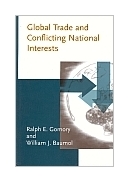|
||
• wydawnictwa polskie
• Zamów informacje o nowościach z wybranego tematu • kontakt
• Cookies na stronie |
GLOBAL TRADE AND CONFLICTING NATIONAL INTERESTSGOMORY R.wydawnictwo: MIT PRESS , rok wydania 2000, wydanie Icena netto: Global Trade and Conflicting National Interests Ralph E. Gomory and William J. Baumol In this book Ralph Gomory and William Baumol adapt classical trade models to the modern world economy. Trade today is dominated by manufactured goods, rapidly moving technology, and huge firms that benefit from economies of scale. This is very different from the largely agricultural world in which the classical theories originated. Gomory and Baumol show that the new and significant conflicts resulting from international trade are inherent in modern economies. Today improvement in one country's productive capabilities is often attainable only at the expense of another country's general welfare. The authors describe why and when this is so and why, in a modern free-trade environment, a country might have a vital stake in the competitive strength of its industries. Ralph E. Gomory is President of the Alfred P. Sloan Foundation. He left the Princeton mathematics faculty to join IBM in the early days of computers. There he became Director of Research and Senior Vice President for Science and Technology. He was awarded the National Medal of Science. He is a director of several corporations. William J. Baumol is Professor of Economics at New York University and Professor Emeritus at Princeton University. He is former president of the American Economic Association and of three other professional associations. "Combine economies of scale with many industries. Stir in some old theory and some new technique. Out comes a complex and novel picture of a world trading pattern in which national strategy can really matter. This book should be read carefully, but above all it should be read." Robert M. Solow, Institute Professor of Economics, Emeritus, Massachusetts Institute of Technology, and Nobel Laureate in Economics (1987) "This work by two distinguished scholars presents an important and modern emendation to the classical Ricardo theory of international trade. The authors show that under highly plausible conditions the selection of international specialization is far from unique and may depend critically on acquired knowledge and the flexibility of human capital in ways never considered by conventional trade theory. The argument is not protectionist but rather falls in the tradition of monopolistic competition, which fits the realities of international trade far closer than pure competition. This is a fundamental contribution that calls for a basic rethinking of international trade competition." Martin Shubik, Seymour Knox Professor of Mathematical Institutional Economics, Cowles Foundation for Research in Economics, Yale University "When you pair a world-class mathematician with a world-class economist, you should be prepared for a spectacular outcome. The Gomory-Baumol book is an apt illustration. They have cast new light on an old finding: the possibility under increasing returns of multiple equilibria, some Pareto-better than others, and each affecting the distribution of gains (in the superior equilibria) differentially. Although accessible to a wide audience, this is a book to be treasured by trade specialists as well," Jagdish Bhagwati, Arthur Lehman Professor of Economics, Columbia University "In this lucid, marvelously accessible work, Ralph Comory and William Baumol draw on the theory of economic equilibrium and their own impressive experience to discuss the role played by economies of scale in maintaining the viability of established manufacturers. They also consider the possibilities of limited governmental intervention to influence which of the many possible equilibria will be realized." Herbert E. Scarf, Sterling Professor of Economics, Yale University 197 pages Księgarnia nie działa. Nie odpowiadamy na pytania i nie realizujemy zamówien. Do odwolania !. |


